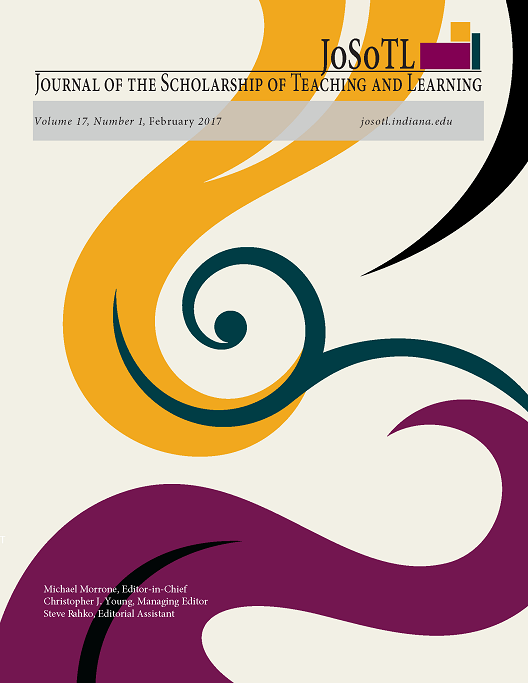Managing Student Self-Disclosure in Class Settings: Lessons from Feminist Pedagogy
Main Article Content
Abstract
Downloads
Article Details
- Authors retain copyright and grant the Journal of the Scholarship of Teaching and Learning (JoSoTL) right of first publication with the work simultaneously licensed under a Creative Commons Attribution License, (CC-BY) 4.0 International, allowing others to share the work with proper acknowledgement and citation of the work's authorship and initial publication in the Journal of the Scholarship of Teaching and Learning.
- Authors are able to enter separate, additional contractual agreements for the non-exclusive distribution of the journal's published version of the work (e.g., post it to an institutional repository or publish it in a book), with an acknowledgement of its initial publication in the Journal of the Scholarship of Teaching and Learning.
- In pursuit of manuscripts of the highest quality, multiple opportunities for mentoring, and greater reach and citation of JoSoTL publications, JoSoTL encourages authors to share their drafts to seek feedback from relevant communities unless the manuscript is already under review or in the publication queue after being accepted. In other words, to be eligible for publication in JoSoTL, manuscripts should not be shared publicly (e.g., online), while under review (after being initially submitted, or after being revised and resubmitted for reconsideration), or upon notice of acceptance and before publication. Once published, authors are strongly encouraged to share the published version widely, with an acknowledgement of its initial publication in the Journal of the Scholarship of Teaching and Learning.
References
American College Health Association - National College Health Assessment II: Reference Group Data Report Spring (2012). Hanover, MD: American College Health Association.
American Psychological Association (2007). Guidelines for psychological practice with girls and women. American Psychologist, 62, 949-979.
Bazarova, N. (2012). Public intimacy: Disclosure, interpretation and social judgments on Facebook. Journal of Communication, 62, 815–832.
Berzofsky, M., Krebs, C., Langton, L., Planty, M., Smiley-McDonald, H. (2013, March). Female victims of sexual violence, 1994-2010. U.S. Department of Justice, Bureau of Justice Statistics. Retrieved Feb. 28, 2017 from http://www.bjs.gov/index.cfm?ty=pbdetail&iid=4594.
Black, M.C., Basile, K.C., Breiding, M.J., Smith, S.G., Walters, M.L., Merrick, M.T., Chen, J., & Stevens, M.R. (2011). The National Intimate Partner and Sexual Violence Survey (NISVS): 2010 summary report. Atlanta, GA: National Center for Injury Prevention and Control, Centers for Disease Control and Prevention.
Chesler, P. (2005). Women and madness (2nd rev. ed). New York, NY: Palgrave Macmillan.
Clark, R., Anderson, N. B., Clark, V. R., & Williams, D. R. (1999). Racism as a stressor for African Americans: A biopsychosocial model. American Psychologist, 54, 805-816.
Crawley, S. L. (2008). Full-contact pedagogy: Lecturing with questions and student-centered assignments as methods for inciting self-reflexivity for faculty and students. Feminist Teacher, 19(1), 13-30.
Crawley, S. L., Lewis, J. E., Mayberry, M. (2008). Introduction to special issue -- Feminist pedagogies in action: Teaching beyond disciplines. Feminist Teacher 19(1), 1-12.
Davis, M. H. (1994). Empathy: A social psychological approach. Boulder, CO: Westview Press.
Durfee, A., & Rosenberg, K. (2009). Teaching sensitive issues: Feminist pedagogy and the practice of advocacy-based counseling. Feminist Teacher, 19(2), 103-121.
Eisenberg, D., Hunt, J., & Speer, N. (2013). Mental health in American colleges and universities: Variation across student subgroups and across campuses. Journal of Nervous and Mental Disorders, 201(1), 60-67.
Eisenberg, D., Nicklett, E. J., Roeder, K., & Kirz, N. E. (2011). Eating disorder symptoms among college students: Prevalence, persistence, correlates, and treatment-seeking. Journal of American College Health, 59(8), 700-707.
Fine, M. (1985). Reflections on a feminist psychology of women: Paradoxes and prospects. Psychology of Women Quarterly, 9, 167-183.
Forrest, L., & Rosenberg, F. (1997). A review of the feminist pedagogy literature: The neglected child of feminist psychology. Applied and Preventive Psychology, 6, 179-192.
Gaertner, S. P., Rust, M. C., Dovidio, J. F., Bachman, B. A., & Anastasio, P. A. (1994). The contact hypothesis: The role of common ingroup identity on reducing intergroup bias. Small Group Research, 25, 224-249.
Grauerholz, E., & Copenhaver, S. (1994). When the personal becomes problematic: The ethics of using experiential teaching methods. Teaching Sociology, 22, 319-327.
Harper, V. B, Jr., & Harper, E. J. (2006). Understanding student self-disclosure typology through blogging. The Qualitative Report, 11, 251-261.
Konrath, S., Falk, E., Fuhrel-Forbis, A., Liu, M., Swain, J., Tolman, R., Cunningham, R., Walton, M. (2015). Can text messages increase empathy and prosocial behavior? The development and initial validation of text to connect. PLoS ONE 10(9): e0137585.
LaFrance, M. N. (2009). Women and depression: Recovery and resistance. New York, NY: Routledge.
McGrath, E., Keita, G. P., Strickland, B. R., & Russo, N. F., (Eds.). (1990). Women and depression: Risk factors and treatment issues: Final report of the American Psychological Association’s National Task Force on Women and Depression. Washington, DC: American Psychological Association.
National Association for Mental Illness (2012). College Students Speak: A Survey Report on Mental Illness. Retrieved Feb. 28, 2017 from http://www.nami.org/collegereport
Nicholson, P. (2010). Domestic violence and psychology: A critical perspective. London: Taylor and Francis.
Phillips, B. D. (1988). Teaching about family violence to an at-risk population: Insights from sociological and feminist perspectives. Teaching Sociology, 16, 289-293.
Rocca, K. A. (2010). Student participation in the college classroom: An extended multidisciplinary literature review. Communication Education, 59, 185-213.
Rosenbloom, S. R., & Fetner, T. (2001). Sharing secrets slowly: Issues of classroom selfdisclosure raised by student sex workers. Teaching Sociology, 29, 439-453.
Searight, H. R,. & Searight, B. K. (2012). College students’ self-disclosure in writing assignments: Professional and ethical issues. International Journal of Modern Education Forum, 1, 16-19.
Shrewsbury, C. M. (1987). What is feminist pedagogy? Women’s Studies Quarterly, 15, 6-14.
Sinacore, A. L., Healy, P., & Justin, M. (2002). A qualitative analysis of the experiences of feminist psychology educators: The classroom. Feminism and Psychology, 12(3), 339-362.
Tucker, J., & Lowell, C. (2015). National snapshot: Poverty among women and families, 2015. Report for the National Women’s Law Center. Retrieved Feb. 28, 2017 from http://nwlc.org/resources/national-snapshot-poverty-among-women-families-2015/
Ussher, J. M. (2011). The madness of women: Myth and experience. New York, NY: Routledge.
